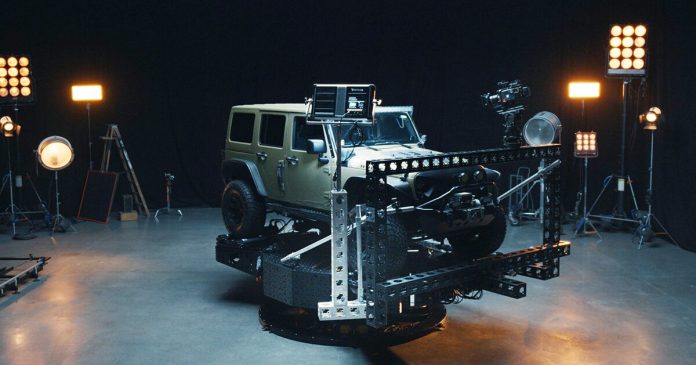Your action movie is coming together nicely, but it needs something thrilling, like an explosive car chase – and you’re nearly out of budget. We’ve all been there, right? Right?
Well, thankfully, award-winning filmmaking tech company Pixomondo has a fix(omondo). Its new PXO Akira system, showcased at CES, lets you plonk practically any vehicle – a car, motorcycle, or even a small plane – onto a platform that can spin 360 degrees on command, along with your camera rig to capture it in any sort of motion you need to simulate for exciting shots.
This contraption pairs with a wall of linked LED screens (known as a LED volume) that can display environs rendered in real-time using Unreal Engine (which is commonly used to build 3D worlds and big-name video games). There’s also a robotic camera crane, a driving simulator, and software to tie it all together.
PXO AKIRA | The Ultimate Vehicle Processing Ecosystem
The short promo video above should give you a taste of how the platform works; you can also click through to this six-minute overview of the entire system to see more of the components working together.
Once the Akira ecosystem is set up in a sound stage, you’re all set to shoot without the limitations of being on location, dealing with challenging weather, or working with a small crew.
Motion platform
The spinning base is especially noteworthy, because it’s built to easily support a large vehicle, along with a modular rigging system to fit cameras and lights. It can power them all internally, and freely spin and move along six degrees of motion for a variety of angles of your vehicle.

Pixomondo / Sony
That base also has adjustable pedals beneath each wheel, which control the car’s suspension and spin its tires for realistic shots.

Pixomondo / Sony
Robot camera crane
Pixomondo says its Akira system includes one of four TechnoDolly 25 camera cranes in the world. I can’t be sure about its rarity, but it appears that one of these will set you back by US$950,000. This is a programmable robotic arm on a 59-ft-long track (20 m) that can rise up to a height of 24 ft (7.3 m) to capture challenging shots.

Pixomondo / Sony
It can precisely repeat these camera motions as many times as needed, so you can do neat stuff like time lapses and layered shots.
Driving simulator
Pixomondo says it’s put together a top-of-the-line driving simulation system, complete with a steering wheel, pedals, and all the rest, for you to influence the platform-mounted vehicle’s motion. This means you can make it look like a car’s being driven rashly through city streets, or drifting smoothly through a race track.

Pixomondo / Sony
LED volume and software
Okay, so you’ve got your vehicle and your cameras are ready to roll. You’ll then need to fire up the LED volume to display the environment in which you want to shoot your action sequences. Here’s where things get really wild.

Pixomondo / Sony
The Akira system lets you capture your vehicle on the platform in front of a green screen to splice a background and special effects later on. But you can also shoot the vehicle moving in sync with 3D graphics or environmental footage playing on the LED panels. This works great because the on-screen content throws light pretty naturally onto the subjects in front of it, and creates a realistic background to use while filming.
If you use a synthetic environment generated in a game engine or 3D software, you can chart a path for the vehicle, and the platform will mimic what it’s like for the car mounted on it to traverse through that path – including driving conditions like bumpy roads.
Finally, powerful software ties all this together so the components work in tandem to make it easy to capture action shots in a studio setting. You can visualize and plan shots ahead of time in pre-production, and then control all the hardware for those shots as they’re being filmed. There’s also an included asset library from which you can choose real-world locations and traffic conditions to display on the LED volume.

Pixomondo / Sony
Pixomondo says this is the first system to integrate all these tools together. You probably can’t buy it, though. The Sony Pictures Entertainment-owned company told Befores and Afters the idea is to rent it out to film production teams on demand.
“The entire system can be shipped to any LED volume or soundstage worldwide. Before deployment, we use our Digital Twin system to virtually map and pre-visualize the shoot, allowing us to optimize the setup and workflows in advance. Once on-site, PXO Akira can be quickly assembled and calibrated, ensuring minimal downtime for production teams. Our vision is to have multiple PXO Akira units stationed at key locations worldwide, enabling productions to book and utilize PXO AKIRA-enabled facilities without the need for transportation. This approach will save time, streamline logistics, and make PXO Akira accessible to global productions.”
The last time I heard about a major leap in vehicle filming tech was back in 2016, when VFX firm The Mill built a stand-in for cars that was little more than a chassis with a camera bolted on. That system, known as the Blackbird, enabled filmmakers to easily take it to any location they wanted to shoot in, grab great footage, and then swap in a photorealistic 3D render of whatever car they wanted to feature in a commercial or movie scene.
Pixomondo has used the system to produce promotional material for it, and plans to shoot a short film using only the PXO Akira. The special effects company says it’s already received enquiries from production teams to book the Akira for shoots this year, so it likely won’t be long before we see shots created using this ecosystem on the silver screen.
Source: Pixomondo




